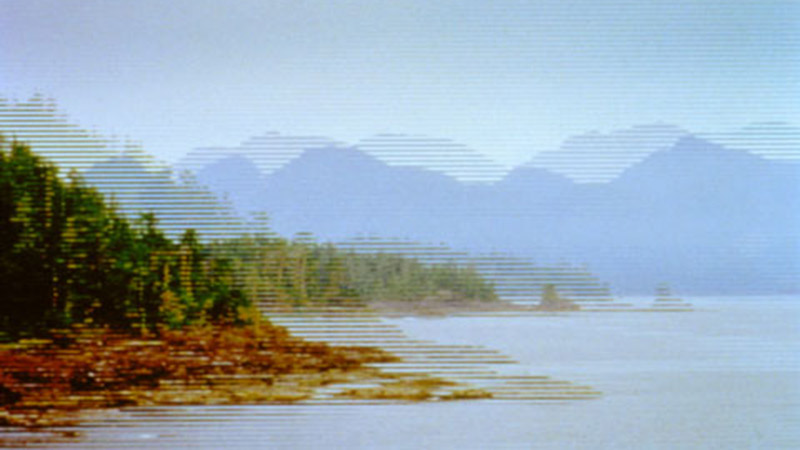 by Stan Douglas (1996)
by Stan Douglas (1996)6:50 min, single-channel color video projection, quadraphonic sound
“It is no surprise,” writes Stan Douglas in his text on Nu•tka•, that the Gothic novel narratives with their vampires and other monsters “flourished during the era of high imperialism—when remote and exotic areasof the world were being drawn into the European orbit . . .” For it is widely known that the discovery of the “foreign” was accompanied by its oppression and destruction, while the repressed threatens to returnin the sublimated manifestations of the uncanny. The video installation takes us to the west coast of Vancouver Island, to Nootka Island, where the first Europeans landed in 1774. The island was given its present name two years later as the result of a misunderstanding: when James Cook asked Chief Maquinna the name of his land, he replied “Nootka!” which roughly means “go” or “turn-around.”For a brief time, mutually beneficial trade relations between the Euro-peans and “Nuu-chah-nulth” were maintained, until the Spaniards and Britons clashed—irrespective of the native inhabitants—over issues of colonial claims to Nootka Sound.
Nu•tka• focuses on the two opponents Esteban José Martínez, envoy of the Spanish crown, and James Colnett, representative of a British trading company. The two met on Nootka Sound in 1789: one with the mission of establishing a colony whence the expansion of New Spain was to be instigated; the other on behalf of John Mears, who laid claimto the island for himself and the British crown, planning to set up a permanent foreign trading post. Following a fierce argument, Martínez took the Briton, including ship and crew, prisoner, whereupon Colnett went shortly thereafter insane. Callicum, chief of the neighboring Clayoquot Sound—displeased at this development as he respected the British as trading partners—took Colnett’s side. In a skirmish, Callicum was accidentally shot by Martínez’screw, which not only caused the Nuu-chah-nulths to cease relations with the Spaniards once and for all but also caused Martínez to forfeit the trust of his government. As such, Colnett and Martínez both failed: one lost his ship, business, and mind and the other his position of supremacy.
The Nu•tka• video installation is based on two camera pans along the imposing landscape of Nootka Sound unified on the screen. Douglas has interwoven the images line by line, the landscape sometimes confusingly melding together, sometimes drifting apart, constantly seem-ing to dissolve, following its ghostly afterimages. Only at six points do the pictures run synchronously, and the landscape finds itself again, only to drift away once more. From the off, we hear two different voices, one representing Martínez, the other Colnett. The quadraphonic sound system that Douglas useshere lends the two disembodied voices an invisible, uncanny presence. They speak at the same time, each describing his own view of the conflict. Colnett’s monologue heralds his growing delirium, while Martínez’s words be speak frustration. The script of their soliloquiesis based on historical documents and journals. The cacophony is regularly interrupted, precisely at those six points where the camera pans over Nootka Sound harmonize. Colnett and Martínez then jointly recitetext fragments from colonial and Gothic novels by Edgar Allan Poe,Cervantes, Jonathan Swift, Captain James Cook, or the Marquis deSade. The threat of getting lost in the thicket of foreign landscapes is as present in both men’s remarks as is their fear of the return of the repressed: meaning to equal extent both the native inhabitants and the desire to indulge in the transgression of reason and law far from home.
In Nu•tka• the landscape becomes a mirror of the constant oscillation of the Western soul between self-assertion and dissolution, conflict and conciliation—and of the ostracized third person. (Text borrowed from Iris Dressler)
To start drifting, simply follow the link below. Enjoy.
http://ubu.artmob.ca/video/Douglas-Stan_Nutka_1996.avi
No comments:
Post a Comment